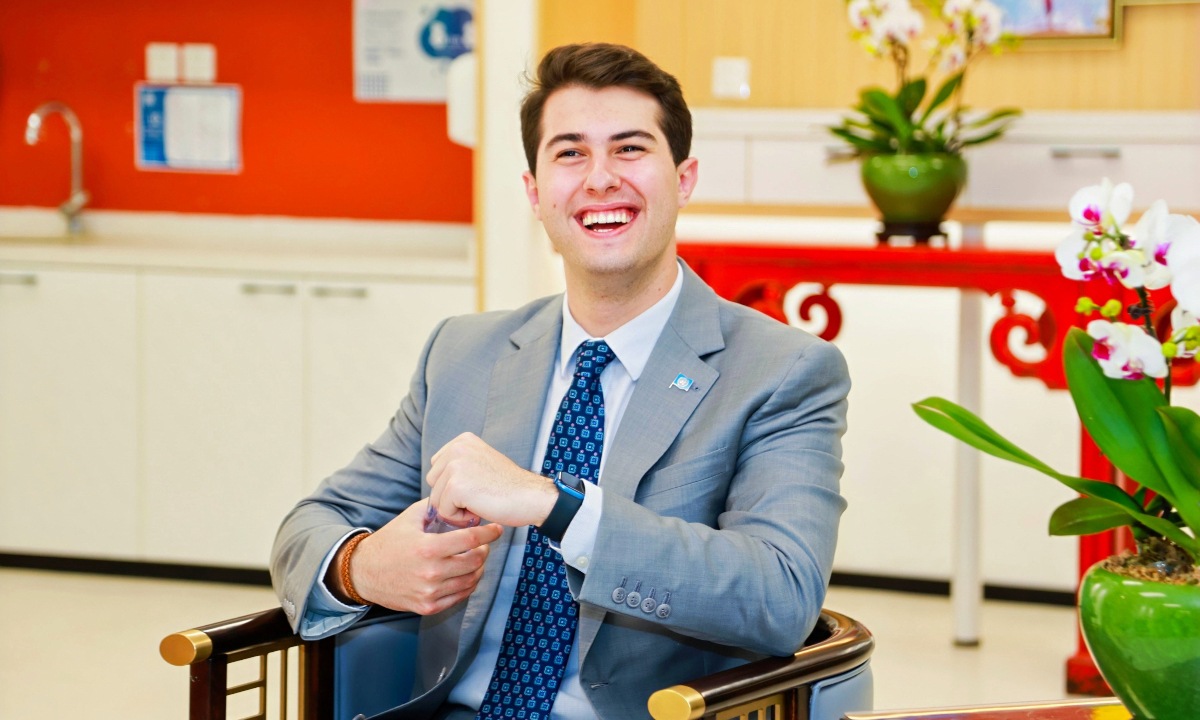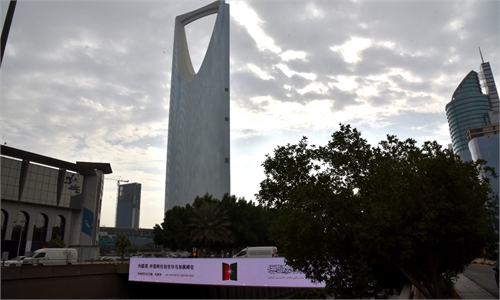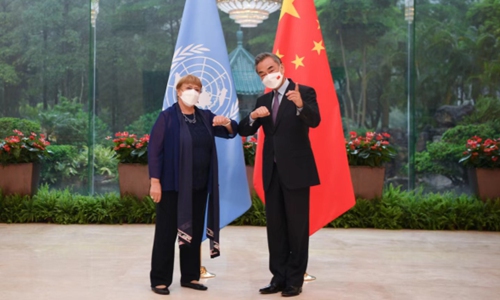China’s approach offers a broader perspective on what human rights can encompass: UN Ambassador

Daniel del Valle Blanco. Photo: Courtesy of Blanco
Editor's Note:
As the Ambassador and Permanent Observer of the International Youth Organization (OIJ) to the United Nations, H. E. Mr. Daniel del Valle Blanco (Blanco) recently visited China and engaged with China's young generation, which he said shaped his view of China as a nation that fosters a youth-led future. Cheng Guoping, vice president of the China Association for International Friendly Contact and former vice minister of foreign affairs, received Blanco and his delegation. Cheng expressed his gratitude to Ambassador Blanco for his help and understanding of China's youth diplomacy in the international field, and for promoting Chinese culture and Chinese civilization on various UN platforms. A classical printed version of Siku Quanshu, literally the Complete Library of the Four Treasuries, an ancient Chinese book from the Qing Dynasty (1644-1911), was given to Blanco as a gift. Yang Yongchun, first-level inspector of relevant national foreign-related departments and investigator of global criminal justice issues, accompanied Cheng to meet Blanco. Yang exchanged views with the visitors on China's human rights protection in the Xinjiang and Xizang regions. Global Times (GT) reporters Wang Wenwen and Li Meng spoke to Blanco about his trip, as well as his views on human rights.
GT: You visited China recently. What is your general impression of China during your visit?
Blanco: My recent visit to China profoundly impressed me with its vibrant culture, advanced infrastructure, and the dynamic spirit of its people. The commitment to both tradition and modernity creates a unique environment where historical richness and futuristic innovation coexist harmoniously.
Throughout my travels in Shanghai, Beijing, Chongqing, Hangzhou, and Xiamen, I engaged in frank and candid exchanges with the youth. These interactions revealed a deep-rooted enthusiasm and a forward-looking perspective that is widespread among the young generation. Their insights and aspirations underscored a collective drive toward sustainability and technological advancement, shaping my view of China as a nation that actively fosters a youth-led future.
GT: You communicated with Chinese young people. What do you think of their outlook? Why do you think it is important to engage with young people?
Blanco: The Chinese youth I met displayed a remarkable sense of purpose and a deep understanding of global issues, particularly in areas like technology, environmental protection, and human rights. Their vigor and creativity were palpable, marked by an eagerness to innovate and aim high in all their endeavors. This was evident in their proactive approach to challenges and their readiness to adopt new technologies and ideas for sustainable development.
Engaging with young people is vital as they bring these innovative solutions and fresh energy, essential for addressing global challenges and driving societal progress. Their dynamic spirit and ambitious goals reinforce the importance of incorporating their perspectives in shaping the future.
GT: What advice would you give to promote youth exchanges between different countries?
Blanco: I would advise enhancing structured exchange programs that focus on shared global challenges, promoting digital interaction platforms for continuous engagement, and supporting initiatives that allow young people to work on multinational projects. This will not only foster understanding but also build a foundation for future collaboration.
Recognizing that different countries are at various stages of development and have distinct cultures and traditions is crucial. By facilitating exchanges, we enable young people to appreciate these differences, which is fundamental to building a harmonious world. Moreover, instilling in youth the belief that all disputes and problems can be resolved through dialogue from an early age will equip them with the tools necessary for peaceful conflict resolution and contribute to global peace and stability.
GT: China emphasizes unswerving adherence to China's path of human rights development, saying living a happy life is the biggest human right for the people. What do you think of China's view toward human rights?
Blanco: China's approach to human rights, focusing on happiness and development, offers a broader perspective on what human rights can encompass. This approach emphasizes the importance of social and economic stability as foundational to achieving civil and political rights, advocating for a comprehensive view of human rights.
During my visit, I gradually understood that China places the development rights of its people foremost. It became clear that without a decent life, discussions on human rights are merely theoretical. This practical focus on ensuring the basic necessities -- such as health, education, and economic opportunity -- prioritizes the most fundamental human rights, making the concept of human rights tangible and meaningful for the entire population.
GT: The definition of human rights in the US and the West has become narrower and narrower. They place too much emphasis on political rights while ignoring the most basic human rights of survival and development. Why don't the most basic human rights such as the rights to health, survival and development receive sufficient attention in the West?
Blanco: Often, in the West, there's a historical focus on political and civil liberties that sometimes can overshadow essential economic and social rights. However, for many around the world, the rights to health, education, and economic opportunity are fundamental. Broadening the human rights dialogue to include these aspects is crucial for addressing the holistic needs of all populations.
During my visit to China, I witnessed firsthand the practical and hardworking nature of the Chinese people, who are focused on tangible achievements rather than theoretical discussions. They work diligently to provide for their families, and this effort translates into the enjoyment of their fundamental rights.
In schools and markets, I saw smiling faces, a testament to the satisfaction and stability in their daily lives. The Chinese have clear national plans that prioritize real-world applications of human rights, aligning development with the genuine well-being of their citizens. This practical approach underscores that without a decent living standard, conversations about human rights remain hollow. Visiting China was eye-opening; it revealed that true human rights encompass more than just political declarations -- they are about making everyday life better for the people. This perspective is something that many in the West may not fully appreciate without seeing it in action as I did in China, where human rights mean living a fulfilled and happy life.
GT: What is the significance of China's human rights proposition for redefining human rights worldwide, especially for developing countries to explore their own path for human rights development?
Blanco: China's human rights proposition underscores the importance of contextual solutions in human rights practices. For developing countries, this model provides an alternative pathway to prioritize development and social harmony under the human rights umbrella, which is critical for their unique socio-economic conditions. Despite being the second largest economy in the world, China remains a developing country with its own unique development trajectory. It is actively filling gaps in various areas, which involves tailoring its growth strategies to fit the specific needs and conditions of the country. This approach is evident in how China, while maintaining openness to the world, forges its own path to development. There is a noticeable economic imbalance across the country, with wealthier coastal provinces and cities extending support to more remote and less developed regions. This internal assistance is a fundamental aspect of China's strategy to achieve common prosperity, a goal that may sometimes lead to misunderstandings internationally. However, this model of mutual aid and tailored developmental policies provides a practical blueprint for other developing nations seeking to balance growth with equitable social outcomes under their own unique circumstances.
GT: As President of the UN-Habitat Youth Advisory Board, Ambassador of the International Youth Organization (OIJ) to the United Nations and Special Envoy for Youth of the Central American Parliament, how will you promote China's voice of human rights on the broader global stage?
Blanco: I am committed to promoting China's voice on human rights on the global stage.
My interest in China has been greatly enhanced by my special advisor, Anni Huang, who has shared many fascinating insights about the country.
Through Anni's guidance and a very successful panel discussion facilitated by Professor Yang Yongchun with the Human Rights Institute under Southwest University of Political Science and Law, I have gained a deeper understanding of how China is redefining human rights.
Inspired by my conversation with former vice foreign minister Cheng Guoping, I am motivated to initiate more exchange programs between nations and with the world at large. This engagement has reinforced my commitment to introducing more Chinese exchange programs at the UN and organizing a Chinese human rights study group in my capacity as the ambassador of the International Youth Organization.
By showcasing successful initiatives and sharing best practices, particularly those involving youth and women's rights, I aim to foster a more balanced understanding and enhance international cooperation on human rights issues.



